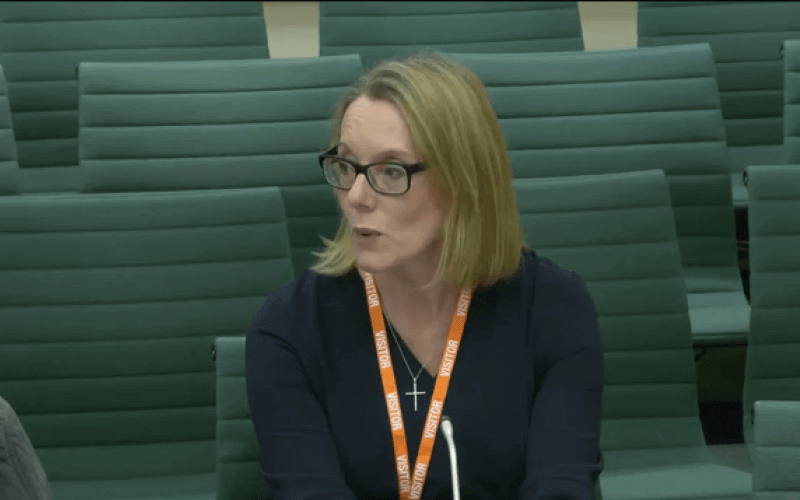DWP’s chief medical adviser downplays her department’s links to countless deaths… again
The chief medical adviser for the Department for Work and Pensions (DWP) has sparked fresh anger after again publicly downplaying links between the deaths of disabled benefit claimants and her own department’s actions.
Dr Gail Allsopp, who was appointed to the role 17 months ago, caused concern last month when she dismissed the importance of hundreds of secret internal process reviews (IPRs) carried out by her own department into the deaths of claimants.
Now she has again publicly downplayed evidence that closely links countless deaths to her department, and she has even suggested that MPs should remember how many claimants die when DWP is not responsible for their deaths.
She also told MPs that it was inevitable that many claimants would die every year because of the number of people her department deals with.
She told the Commons work and pensions committee yesterday (Wednesday): “The sheer number of people that our department touches and the lives that they touch, there are, of course, going to be lots of people that die in the process, every single year, who are in touch with our department.
“Sometimes there will be a trigger within the department that makes something worse, but actually there will be lots of people that die where there is no trigger within the department.”
Allsopp was giving evidence to the committee in its final session of an inquiry into safeguarding vulnerable claimants.
She had been responding to a question by disabled Liberal Democrat MP Steve Darling, who had asked how the department could improve the data it collects on serious harm and deaths of working-age benefit claimants.
Darling also asked whether coroners should be asked to record whether a claimant was a working-age benefit claimant on death certificates to “help us understand where there are challenges with systems impacting on people’s well-being”.
But Allsopp told the committee it was “really important” to say that the cause of a suicide “was never one thing” and that “some of the risk factors for suicide, particularly for working-age people and particularly for men, are loss of work and loss of income” so “of course people who are on benefits will be at risk”.
She said that that “doesn’t necessarily mean it’s the department that is the only trigger for that suicide”, and that her team takes a “holistic approach to what is going on”.
She said that the few prevention of future deaths (PFD) reports sent to DWP by coroners since starting in her role 17 months ago were “really important because that also gives us an idea of the different number of services that people are interacting with”.
She again downplayed DWP’s role in those deaths, telling the committee that “we are never the sole agency that is working with people… people that often have chaotic and very difficult lives, and I think that’s really important to take into account when we’re thinking about this”.
Two of the PFD reports sent to DWP since Allsopp’s appointment related to the deaths of Kevin Gale, and Nazerine Anderson,.
Both of their deaths were closely linked by coroners to flaws within the universal credit system, and in both cases the reports were only sent to DWP, and no other public bodies.
On 4 March 2022, Gale took his own life after becoming overwhelmed by the universal credit application process.
In June 2023, the death of Nazerine Anderson followed six missed opportunities by DWP to record her vulnerability.
Her case had been randomly selected for a “performance measurement review” of her universal credit claim, and she was told she owed nearly £13,000 in back-payments following her husband’s death.
Debbie Abrahams, the Labour chair of the committee, told Allsopp yesterday that there was a need to discover the “true scale of deaths of claimants”.
She said: “Although we know that you have investigated, I think, about 80, 90 over the past year [through IPRs], we don’t know whether that is a true reflection of the number of claimant deaths.”
And she reminded Allsopp that not all such deaths were suicides.
She told Allsopp: “Errol Graham didn’t die of suicide. He died of starvation.”
Alison Burton, daughter-in-law of Errol Graham – who starved to death after DWP wrongly removed his out-of-work disability benefits – told Disability News Service yesterday that she was appalled by Allsopp’s comments.
She said: “What she’s saying to the public is ‘no matter what we do, people are going to die anyway and you can’t hold the government responsible’.
“She’s downplaying the severity of these deaths and the role the department is playing in them.
“She doesn’t believe that the department has done anything wrong.”
Burton, who had watched the evidence session, said: “It’s attitudes like that that [explain] why things aren’t getting done and people aren’t getting safeguarding when they should be safeguarding them.”
Sir Stephen Timms, the social security and disability minister, had said earlier in the session that he wanted to rebuild trust and confidence in the department (see separate story), but Burton said: “You aren’t building confidence when you have [other members of the team] who aren’t on the same page.
“‘People are going to die, get over it.’ That’s the attitude. I find that very insulting.”
Last month, Allsopp told the committee (PDF) that she only viewed the five deaths in the previous 16 months that had led to a coroner sending the department a PFD report as the only deaths “that are associated from a DWP perspective”.
In fact, DWP has carried out hundreds of IPRs of deaths of claimants linked to its actions over the last decade, each one examining how the department has handled the case, and they have led to countless recommendations for local and national improvements.
But Allsopp downplayed those reviews, and instead said she believed the “key bit” was the PFD reports.
Credit for this article goes to the Disability News Service


No responses yet